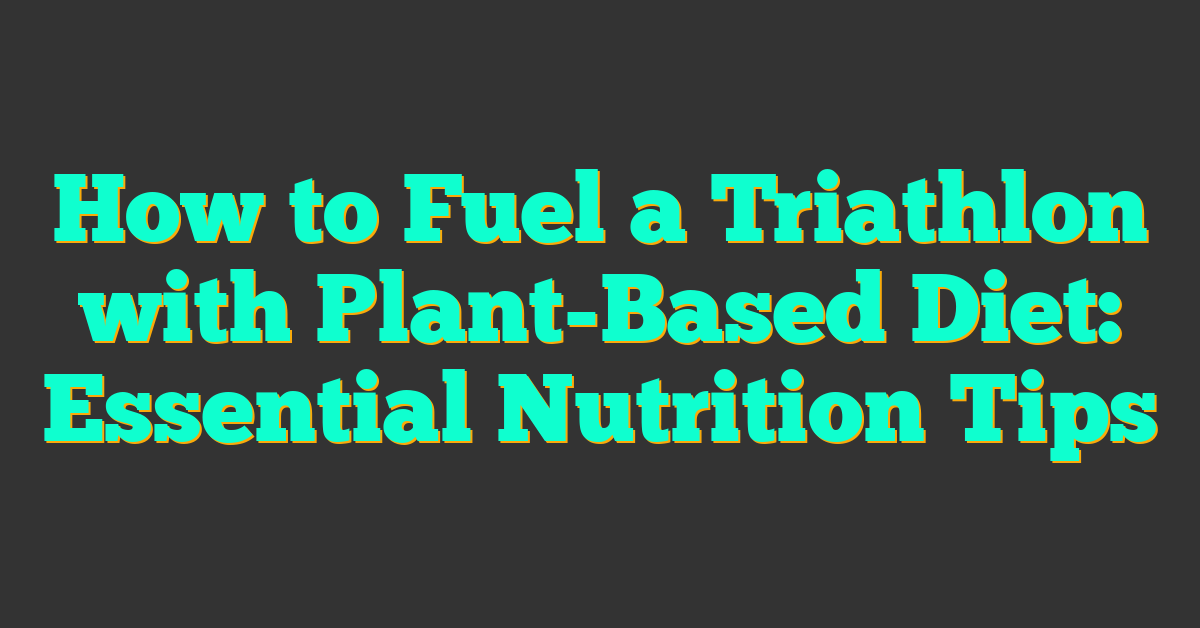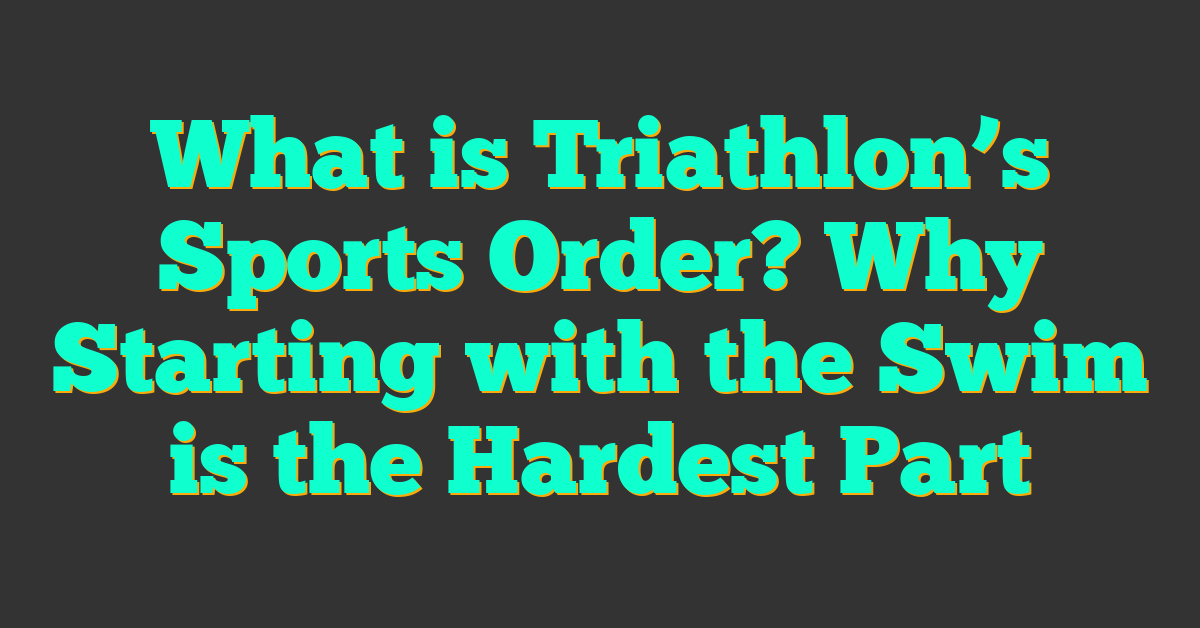Training for a triathlon is no small feat, and fueling your body the right way can make all the difference. I’ve always been passionate about both endurance sports and a plant-based lifestyle, so combining the two was a natural step for me.

Discovering how to effectively fuel my triathlon training with plant-based nutrition transformed my performance and overall well-being. From energy-boosting meals to optimal recovery strategies, embracing a plant-based diet opened up a whole new world of possibilities.
Join me as I share the insights and tips that helped me power through long training sessions and race day with the vibrant energy that comes from nourishing your body with plants.
Benefits of a Plant-Based Diet for Triathletes
- Enhanced Endurance: Plant-based carbohydrates from foods like quinoa and sweet potatoes provide sustained energy during long training sessions and races.
- Improved Recovery: Antioxidant-rich vegetables and fruits, such as kale and blueberries, reduce muscle inflammation and accelerate recovery between workouts.
- Optimal Weight Management: Low-calorie-density meals, including legumes and leafy greens, help maintain an ideal body weight essential for peak performance.
- Better Digestive Health: High fiber intake from whole grains and beans promotes efficient nutrient absorption and minimizes gastrointestinal issues during events.
- Reduced Inflammation: Anti-inflammatory foods like turmeric and ginger support joint health and decrease the risk of overuse injuries.
- Increased Mental Clarity: Nutrient-dense plant foods enhance cognitive function, aiding in focus and decision-making during competitions.
- Sustainable Nutrition: A diverse plant-based diet ensures a wide range of vitamins and minerals, supporting overall health and athletic longevity.
Essential Nutrients for Triathlon Fueling
Proper nutrient intake boosts my triathlon performance and recovery. Focusing on essential nutrients ensures I stay energized and strong throughout training and race day.
Protein Sources
Protein aids muscle repair and growth. I incorporate various plant-based protein sources, such as:
- Legumes: Lentils, chickpeas, and black beans deliver essential amino acids.
- Tofu and Tempeh: Versatile and high in protein, perfect for meals.
- Quinoa: A complete protein containing all nine amino acids.
- Nuts and Seeds: Almonds, chia seeds, and hemp seeds provide protein and healthy fats.
- Edamame: Young soybeans offer a protein-packed snack option.
Iron and Calcium
- Iron-Rich Foods: Spinach, lentils, and fortified cereals enhance oxygen transport.
- Calcium Sources: Fortified plant milks, broccoli, and kale strengthen bones.
- Vitamin C: Combining citrus fruits with iron sources boosts absorption.
- Nuts and Seeds: Almonds and sesame seeds contribute to calcium intake.
- Whole Grains: Brown rice and oatmeal provide both iron and calcium.
| Nutrient | Plant-Based Sources | Benefits |
|---|---|---|
| Protein | Lentils, tofu, quinoa, almonds, edamame | Muscle repair and growth |
| Iron | Spinach, lentils, fortified cereals | Enhanced oxygen transport |
| Calcium | Fortified plant milks, broccoli, kale | Bone strength and density |
Meal Planning Strategies
Effective meal planning supports sustained energy and optimal recovery throughout training and races.
Pre-Race Nutrition
Fueling properly before a race enhances performance and endurance. Focus on:
- Carbohydrate-rich meals such as oatmeal with fruits, whole grain pasta with vegetables, or quinoa salad
- Hydrating adequately by drinking 16-20 ounces of water or electrolyte beverages the day before
- Scheduling meals 2-3 hours before the race to ensure proper digestion
Post-Race Recovery Foods
Post-race nutrition aids in muscle repair and replenishing energy stores. Include:
- Protein-packed foods like tofu stir-fry, lentil soup, or edamame
- Antioxidant-rich beverages such as berry smoothies or green juice
- Whole grains and healthy fats like brown rice with avocado or chia pudding
Consume a balanced meal within 30 minutes after finishing the race to maximize recovery.
Supplements to Consider
Supplementing your plant-based diet ensures you meet the nutritional demands of training and racing.
- Vitamin B12: Crucial for nerve function and red blood cell production, especially since plant-based sources are limited. I take a daily supplement of 250 mcg to maintain adequate levels.
- Iron: Supports oxygen transport and energy production. I supplement with 18 mg daily, pairing it with vitamin C to enhance absorption from plant sources like spinach and lentils.
- Omega-3 Fatty Acids: Reduce inflammation and promote heart health. I use algae-based supplements, taking 1,200 mg of EPA and DHA combined each day.
- Protein Powder: Aids in muscle repair and growth. I incorporate 20 grams of pea protein powder into my post-training shakes to meet my protein needs.
- Vitamin D: Essential for bone health and immune function. During the winter months, I supplement with 2,000 IU daily to maintain optimal levels.
| Supplement | Daily Dosage | Benefits |
|---|---|---|
| Vitamin B12 | 250 mcg | Nerve function, red blood cell production |
| Iron | 18 mg | Oxygen transport, energy production |
| Omega-3 Fatty Acids | 1,200 mg | Reduces inflammation, heart health |
| Protein Powder | 20 grams | Muscle repair, growth |
| Vitamin D | 2,000 IU | Bone health, immune function |
Incorporating these supplements helps bridge nutritional gaps, supporting my training and enhancing performance on race day.
Common Challenges and Solutions
Ensuring Sufficient Protein Intake
Meeting protein needs can be tricky on a plant-based diet. I rely on diverse sources like lentils, tofu, and quinoa to maintain muscle mass and support recovery.
Balancing Macronutrients
Finding the right balance of carbohydrates, proteins, and fats sometimes feels overwhelming. I plan my meals using a ratio of 50% carbohydrates, 25% proteins, and 25% fats to sustain energy levels during training.
Managing Iron Levels
Iron deficiency poses a risk for endurance athletes. I incorporate iron-rich foods such as spinach and fortified cereals, pairing them with vitamin C sources like citrus fruits to enhance absorption.
Meeting Vitamin B12 Requirements
Vitamin B12 isn’t readily available in plant foods. I take a daily B12 supplement to ensure proper nerve function and energy production.
Navigating Digestive Issues
High fiber intake can lead to digestive discomfort. I gradually increase fiber in my diet and stay hydrated to support smooth digestion.
Planning Balanced Meals
Creating nutrient-dense meals requires careful planning. I use meal prep strategies, preparing ingredients in advance to ensure each meal contains essential nutrients for optimal performance.
Adapting to Limited Food Options During Races
Limited food choices during races can pose a challenge. I prepare homemade energy bars and gels using plant-based ingredients to maintain energy levels without relying on packaged products.
Addressing Omega-3 Deficiency
Omega-3 fatty acids are crucial for reducing inflammation. I include flaxseeds, chia seeds, and walnuts in my diet, and consider an algae-based supplement to meet my needs.
Sustaining Energy Levels
« Open Water Swim Practice for Triathlon: Essential Tips to Boost Performance
Solo Training Tips for Triathlon Success: Boost Your Performance Solo »
Maintaining consistent energy can be difficult with a plant-based diet. I consume complex carbohydrates like sweet potatoes and whole grains, ensuring a steady energy supply throughout training sessions.
Preventing Nutrient Deficiencies
Avoiding deficiencies requires attention to various nutrients. I monitor my intake of calcium, zinc, and vitamin D, using fortified foods and supplements when necessary to support overall health and athletic performance.
Conclusion
Training for a triathlon on a plant-based diet has truly transformed my approach to nutrition and endurance. Embracing plant-based foods not only fueled my workouts but also enhanced my overall well-being.
Seeing the benefits firsthand was incredibly motivating. From sustained energy during long training sessions to quicker recoveries after intense races, the right plant-based choices made all the difference.
If you’re considering this path, give it a try. With thoughtful meal planning and the right nutrients, you can power through your triathlon goals while enjoying the vibrant flavors of a plant-based lifestyle.










